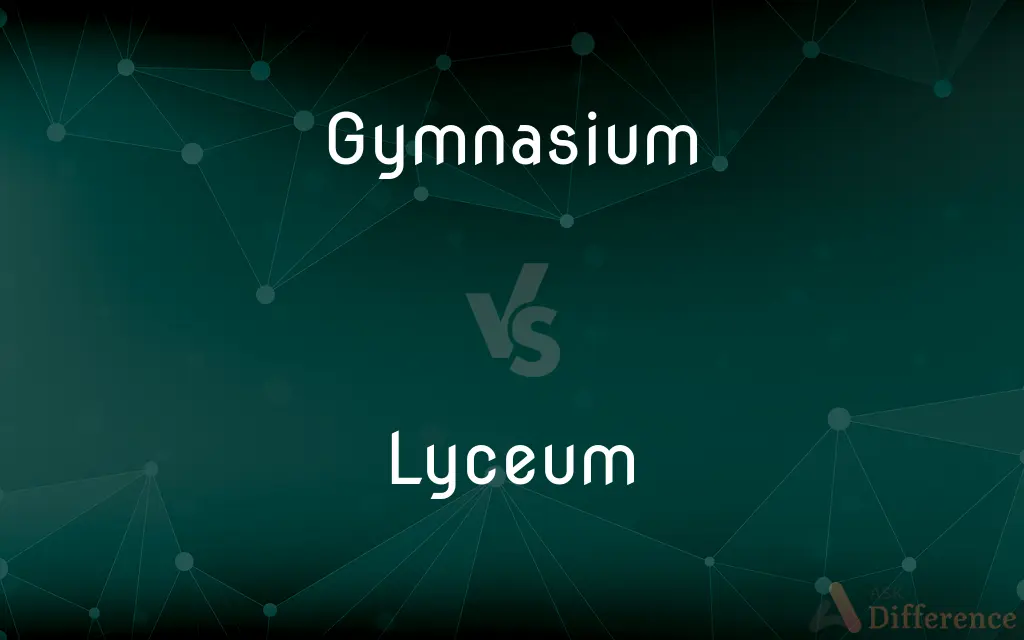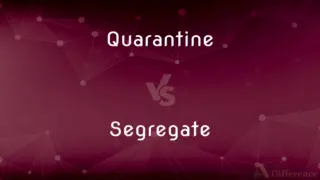Gymnasium vs. Lyceum — What's the Difference?
By Tayyaba Rehman — Updated on November 3, 2023
Gymnasium refers to a place for physical exercise or a German secondary school, while Lyceum generally denotes a place of education or lecture hall.

Difference Between Gymnasium and Lyceum
Table of Contents
ADVERTISEMENT
Key Differences
A gymnasium traditionally is a facility dedicated to athletics and physical education. In many countries, a gymnasium is synonymous with a sports center, where people come to exercise, engage in sports activities, and improve physical fitness. The term 'gymnasium' is also used in some European countries, notably Germany, to refer to a type of secondary school that prepares students for higher education.
A lyceum, on the other hand, has historical roots as a venue for lectures and educational gatherings. The original Lyceum was a school founded by Aristotle in ancient Greece. In modern usage, 'lyceum' can refer to an institution for secondary or higher education, a public hall used for cultural events and lectures, or a society for the discussion of literature, art, science, or philosophy.
Gymnasiums focus primarily on physical development and sporting activities. The gymnasium as an educational institution is more academically inclined, with a curriculum designed to provide a comprehensive education that often includes languages, sciences, and humanities, with the goal of preparing students for university studies.
Lyceums serve as cultural hubs where intellectual and artistic ideas are shared and discussed. When referring to an educational institution, lyceums may offer a curriculum, but unlike gymnasiums, they may not always focus on preparing students for university. Instead, they may provide a more general or vocational education.
Both gymnasiums and lyceums are important educational entities, but their purposes diverge significantly. While gymnasiums emphasize athletic training or rigorous academic preparation, lyceums are centered around cultural and intellectual development, often through lectures and discussions.
ADVERTISEMENT
Comparison Chart
Primary Focus
Physical education and sports/Secondary education in Europe
Lectures, cultural events, and education
Origin
Greek, place for physical training
Greek, Aristotle’s school for philosophical discussions
Modern Use (Facility)
Sports center, fitness club
Venue for public lectures, events, and meetings
Modern Use (Education)
Secondary school preparing for higher education
Educational institute, sometimes not geared towards university
Cultural Role
Promotes physical health and athleticism
Promotes intellectual and cultural development
Compare with Definitions
Gymnasium
An institution for physical education and sports training.
The Olympic athletes trained at the national gymnasium.
Lyceum
A place for lectures and concerts.
The lyceum hosted a series of talks on environmental conservation.
Gymnasium
A space for athletic and gymnastic events.
The competition was held in the central gymnasium of the city.
Lyceum
A society for the discussion of literature, philosophy, or science.
She joined the lyceum to engage with fellow literature enthusiasts.
Gymnasium
A German secondary school that prepares students for university.
She graduated from the gymnasium at the top of her class.
Lyceum
The lyceum is a category of educational institution defined within the education system of many countries, mainly in Europe. The definition varies among countries; usually it is a type of secondary school.
Gymnasium
A room or building equipped for gymnastics and other physical exercise.
The new gymnasium was equipped with the latest fitness technology.
Lyceum
A hall in which public lectures, concerts, and similar programs are presented.
Gymnasium
A facility focused on promoting fitness and health.
Membership at the local gymnasium has increased this year.
Lyceum
An organization sponsoring public programs and entertainment.
Gymnasium
A room or building equipped for indoor sports.
Lyceum
A lycée.
Gymnasium
(gĭm-näzē-m′) An academic high school in some central European countries, especially Germany, that prepares students for the university.
Lyceum
(historical) A public hall designed for lectures, readings, or concerts.
Gymnasium
(formal) A large room or building for indoor sports.
Lyceum
A school, especially European, at a stage between elementary school and college, a lycée.
Gymnasium
A type of secondary school in some European countries which typically prepares students for university.
Lyceum
An association for literary improvement.
Gymnasium
(historical) A public place or building where Ancient Greek youths took exercise, with running and wrestling grounds, baths, and halls for conversation.
Lyceum
A place of exercise with covered walks, in the suburbs of Athens, where Aristotle taught philosophy.
Gymnasium
A place or building where athletic exercises are performed; a school for gymnastics.
Lyceum
A house or apartment appropriated to instruction by lectures or disquisitions.
Gymnasium
A school for the higher branches of literature and science; a preparatory school for the university; - used esp. of German schools of this kind.
More like ordinary schools of gymnasia than universities.
Lyceum
A higher school, in Europe, which prepares youths for the university.
Gymnasium
A school for students intermediate between elementary school and college; usually grades 9 to 12
Lyceum
An association for debate and literary improvement.
Gymnasium
Athletic facility equipped for sports or physical training
Lyceum
A school for students intermediate between elementary school and college; usually grades 9 to 12
Lyceum
A public hall for lectures and concerts
Lyceum
An educational institution for secondary or higher education.
The lyceum's curriculum was renowned for its breadth and depth.
Lyceum
A hall where public lectures, debates, and discussions occur.
Renowned authors gathered at the lyceum for a panel discussion.
Lyceum
A place associated with cultural and intellectual activities.
The lyceum was a popular venue during the cultural festival.
Common Curiosities
Can a gymnasium be an educational institution?
In Europe, yes, a gymnasium can be a secondary school focused on academic preparation.
Are lyceums still used for philosophical discussions?
Not commonly, but some lyceums continue to host intellectual and cultural events.
Do all gymnasiums prepare students for university?
In countries like Germany, yes; elsewhere, they may just be sports facilities.
What activities would you find in a gymnasium?
Physical exercises, sports, gymnastics, and sometimes academic classes.
Can anyone give a lecture at a lyceum?
Generally, speakers are invited or scheduled by the organization running the lyceum.
Do gymnasiums have facilities for all sports?
Most have a range of equipment and spaces, but facilities can vary widely.
What is a gymnasium?
A facility for physical exercise or a type of German secondary school.
Is a lyceum similar to a college?
It can be, but lyceums often have a broader cultural or community focus.
Are lyceums and gymnasiums government-funded?
It varies by country and individual institution; some may be private.
Can I join a gymnasium for fitness purposes?
Yes, many gymnasiums operate as public or private fitness centers.
What is a lyceum?
A place for public lectures, cultural events, or a secondary educational institution.
Do gymnasiums only focus on sports?
As sports centers, yes; as schools, they offer comprehensive academic education.
Do lyceums grant degrees?
Some may offer diplomas or certificates, but they typically don't confer degrees like universities.
Can a lyceum be a private institution?
Yes, lyceums can be either private or public institutions.
How is a lyceum different from a library?
Lyceums are more for lectures and events, while libraries focus on book collections.
Share Your Discovery

Previous Comparison
Awn vs. Barley
Next Comparison
Quarantine vs. SegregateAuthor Spotlight
Written by
Tayyaba RehmanTayyaba Rehman is a distinguished writer, currently serving as a primary contributor to askdifference.com. As a researcher in semantics and etymology, Tayyaba's passion for the complexity of languages and their distinctions has found a perfect home on the platform. Tayyaba delves into the intricacies of language, distinguishing between commonly confused words and phrases, thereby providing clarity for readers worldwide.














































